Stay In Touch!
Sign up for occasional email updates about upcoming events, volunteer & job opportunities, farm happenings, and more.
Unadilla Community Farm is an off-grid, solar-powered, non-profit farm education center, situated on 11 acres in West Edmeston, NY. Unadilla Community Farm incorporated as a 501(c)3 non-profit organization in 2020. In 2024, with financial support from the National Black Food & Justice Alliance, the land on which Unadilla Community Farm operates was purchased by the Stolen Lands Community Land Trust to ensure local stewardship and access to the community farm and education center in perpetuity. Founded in 2014 by millennial first-generation farmers who met through the WWOOF network, the current Board and staff are still first-generation farmers from low-income, low-access and food deserted communities like the ones we serve.
Our mission is to showcase and teach climate-resilient agriculture while increasing food access and access to herbalism for low-income, low-access communities.
What is a community farm?
Many people are familiar with the term ‘community garden,’ which, as defined by USDA, is a collaborative project on a shared open space where participants share in the maintenance and products of the garden, including healthful and affordable fresh produce. As a community farm, we are implementing this concept at scale, engaging dozens of volunteers throughout the season from the communities we serve through our Community Volunteer Days. Volunteers assist with production while learning sustainable farming techniques that are efficient and economical. Similar to a community foundation, which is publicly funded and serves the local community, Unadilla Community Farm is a publicly funded 501(c)3 non-profit that serves the regional community in Central NY State, through our Education & Research, Food Access, and Herbal Aid Programs.
Our vision for a sustainable future.
Sustainability is our common ideal, guiding us in all of our actions. It’s the ability to look beyond our immediate desires, to look deeper inside ourselves, farther into the future, and consider the long-term implications of our actions. Viewing our work through the lens of sustainability pushes us to consider the enduring well-being of everyone and everything on the planet. Our work focuses on developing and sharing skills and products that move us towards this ideal. The community farm provides a space where we can pour our creative energies and manifest our common vision of a sustainable community free from the stresses of mainstream society, where we can participate in and learn about an alternative way of life. It’s a place for sharing knowledge about the practices we follow, the products we offer, and through events, classes, and our fellowship program.
The Unadilla River, which runs alongside our farm, gets its name from the indigenous Oneidan word for “a meeting place.” And at its very core, Unadilla Community Farm is just that – a place for people to come together, learn valuable skills from one another, and celebrate our togetherness with each other and with the natural world.
Unadilla Community Farm is a co-founder & co-organizer of the Leatherstocking Farmers Network, which consists of over 60 members representing farmers, ranchers, food business owners, and ag agencies in the Greater Otsego “Leatherstocking” Region of New York (within a ~50 mile radius of Cooperstown).
Additionally, Unadilla Community Farm is represented by our board and staff on a number of agricultural advisory committees in the region, including:
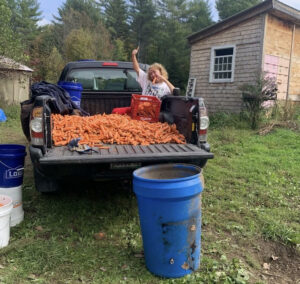
Hello:) Incredibly grateful and excited for the opportunity to return back to Unadilla to continue learning and working with all who live and grow on the land! I am eager to grow and learn about ways we can build strong and resilient communities through farming practices and working towards food accessibility with no barriers. Food security is one part of the web towards building and living in a world free from oppressive and violent systems that deprive people of their basic needs, grateful for this experience to learn and share with others! I love herbalism, singing a little tune, creating art with whatever is in front of me, speaking and learning Gaelic, celtic spirituality, mutual aid initiatives, having my hands in the dirt harvesting while chatting with a stranger or friend and cooking a communal meal<3 Happy to be here!!!!
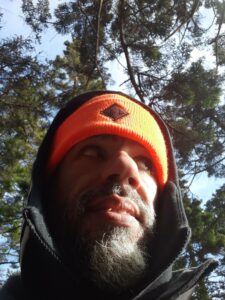
Greetings and Salutations !
I am Jelal , Oakland, California -born anti-capitalist and lifelong student of this incredible, often overwhelming , reality . As a biracial-Black poet born to a revolutionary Black woman , I am ever on the lookout for the return to true Matrilineal ways of land inhabitation and human coexistence with each other and our life-abundant planet . I believe meditation and embodied presence can truly heal our species and collective existence . May we learn together . May we heal together . May we step forward anew into a future where basic human rights and sustainable land practices are never in question . Love , peace , & yam .
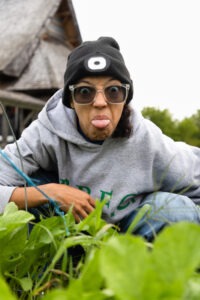
We're incredibly excited to deepen the impacts of our Access and Education programming on working-class neighborhoods local to our farm and community partners while stewarding the Food Forest. For over a decade we've facilitated social, distributive, and procedural justice with cooperatively organized membership communities and non-profit organizations. As an Afro-Indigenous Pennsylvanian organizing self-sustaining communal food and housing sovereignty, engaging in indigenous healing practices and being educated in our original medicine with our trans-local communities of care, we carry on our family's legacy of engaging in mutual aid and organizing housing cooperatives to care for displaced working-class families.
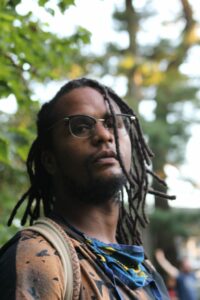
Peace! I am a Philadelphia native seeking healing and peace through the struggle for economic and social liberation from exploitative systems. I live a life of love through contributing to building community-owned infrastructure and mutual-aid resources, connecting with myself and the earth as a means to bring balance to the world around me, and creating conversations where there is complexity, to heal one another and be heard by one another.
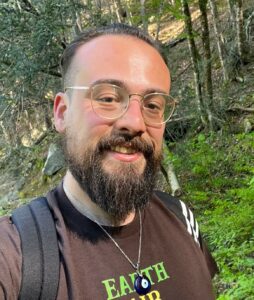
Isaac Supernovich is an educator and career coach. Isaac is a Vermont native who has taught children and adults in many subject areas including social studies, ESL, special education, as well as career and technical education. He has a passion for social justice and community advocacy. He is interested in preparing the next generation for the challenges of tomorrow. He likes to incorporate spirituality and meditation as tools for education, self-improvement, and empowerment.

Amber Johnson is the Organizing Director of the New York Energy Democracy Alliance, working to advance energy justice and community control over energy resources. With five years of experience rescuing and raising discarded farm animals like cattle, goats, and ducks, Amber is passionate about small-scale farming and sustainable food systems. She also grows herbs and vegetables while serving on the boards of the Southern Door Community Land Trust and Unadilla Community Farm. As an alumna of Soul Fire Farm's FIRE (Farming in Relationship to Earth) Immersion program, Amber merges her love for farming with her dedication to social justice. In her spare time, she expresses her advocacy through graphic design, blending creativity with her commitment to farming and equity.
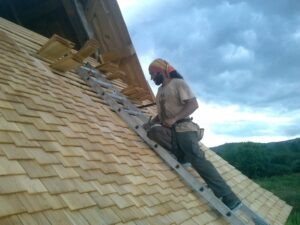
Roberto Zapata: “Unadilla, the home where my heart grew. You held my hand through a tough transformation. Thank you!” Born in Norwalk, CT, Roberto Zapata is a first generation son of Mayra, from Costa Rica, and the late Roberto Zapata Sr., from Colombia. At a very young age Roberto learned how to work with his hands. He has had a long history of wood working and construction. Roberto is a passionate builder, designer, and creator. He apprenticed with an arborist for three years. During this time he learned rigging, SRT climbing, and proper tree pruning. He has independently pursued the study of tree, plant, and mushroom medicines. In 2015 Roberto started a community garden project, Meadows Garden Pride, in the public housing complex where he lived. Through the use of Hügelkultur he created garden beds that required no tilling, fertilizing, or irrigation, thus eliminating many inputs. From 2017-2018 Roberto led campers ages 8-18, and adults of all ages, in foraging, plant identification, and medicinal plant harvesting classes at Holmes Camp & Retreat Center. In 2018 he earned his permaculture certification. Roberto desires to restore land to a place of abundance, not just for people, but for all living beings. Roberto embraces diversity, letting go of ego, and aspires for all people to understand that we all are part of this ecosystem; that Planet Earth, and all the siblings, are our responsibility. Roberto believes in freeing ourselves to begin healing, and surrounds himself with others looking to provide this healing work, and more, for the land. La Jolie Journet is a mobile community outreach program that Roberto, along with Nina Buxenbaum, are currently building, and invite all those interested to link up.
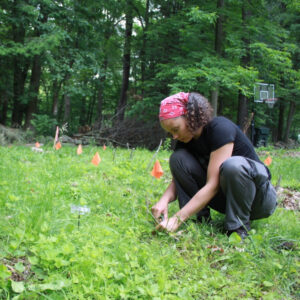
Nina Buxenbaum was born and raised in Brooklyn, NY to a politically active, multi-racial household. She received her MFA degree in painting from the Maryland Institute College of Art and her BFA from Washington University in St. Louis in drawing and printmaking. Ms. Buxenbaum has been an artist and educator for her entire career. First certified as a K-12 Art teacher in New York, she has been teaching at the college level since 2001. She is a Tenured Professor of Painting at York College, CUNY as well as a member, and current faculty, at The Silvermine Artist Guild in New Canaan, CT, and Adjunct Art Faculty at Western Connecticut State University. As an exhibiting professional artist Ms. Buxenbaum has participated in residencies at the Cité Interational des Artes in Paris, France, the Skowhegan School of Painting in Skowhegan Maine, The Artists Alliance in New York, the Byrdcliffe Artist In Residence, NY, The Vermont Studio Center in Johnson, VT, and The Hambidge Center for The Arts in Rabin Gap, GA. Her work has been included in several exhibitions including the Studio Museum of Harlem (NYC, NY), Samson Projects (Boston, MA), the Kentler International Drawing Space (Brooklyn, NY), the Ingalls Gallery (Miami, FL), Rush Arts (NYC, NY), Stella Jones Gallery (New Orleans, LA), and Galerie Myrtis (Baltimore, MD). Her work has also been featured in the International Review of African American Art, and in an Emmy nominated documentary series entitled Shades of US. She and her husband, Roberto Zapata, have been building a Food Forest and hosting classes at their home and have begun a larger scale project at York College, in Jamaica, Queens.
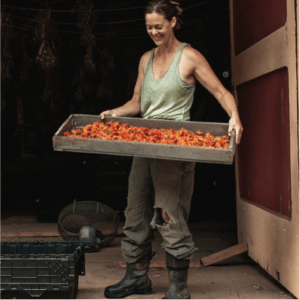
Tianna has been farming in the Northern Catskills for over a decade. Currently, Tianna, Amanda Wong and Walter Riesen own and operate Star Route Farm, LLC. For the last few years, Star Route has transitioned our diversified vegetable and small grain farm into a Food Sovereignty project fundraising to grow food for and with local pantries and Food Justice Organizations in NYC. Concurrent with Star Route, Tianna also founded and manages THE 607 CSA, a 800+ person multi-farm Community Supported Agriculture Project supporting 42 farms in Otsego, Schoharie, and Delaware counties. Tianna sits on the Board of the Center for Agricultural Development and Entrepreneurship, the Watershed Ag Economic Viability Committee, and Congressman Delgado’s Agriculture Advisory Committee. She started the Catskills Chapter of the National Young Farmers’ Coalition. She is also a founding member of Delhi’s Bushel Collective and the Schooner Apollonia, a Hudson Valley Sail Freight venture.
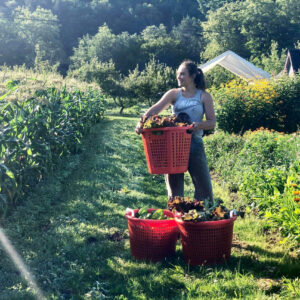
Bari Zeiger is a young farmer and community organizer. Currently, Bari is the Director of Development and Administration at Providence Farm Collective, a Western NY organization centering the actualization of immigrant and refugee food sovereignty through nurturing access to farmland and fresh, culturally relevant foods alongside peer-to-peer education. Bari is the Farmer Representative of NE SARE's Administrative Council, as well as a grant reviewer for the New England Grassroots Fund. She has participated on the National Young Farmers Coalition Ad Hoc Federal Policy Setting Process Committee and currently acts on the Federal Policy Committee as the Women Affinity Representative. Bari is a member of the Finger Lakes Permaculture Institute’s Board of Directors. While earning a degree in Philosophy and Environmental Studies at SUNY Geneseo, Bari interned on a local, certified organic family farm and engaged peers through organizing on-farm volunteer events and on-campus panel discussions related to sustainable food systems. In her final semester, she conducted a Directed Study on the role of structural violence in the U.S. migrant farm labor system, participated in grassroots activism as an ally for migrant dairy workers in Western NY, and co-founded the Student Coalition for Migrant Workers. After graduating in December 2016, Bari moved to the North Carolina Foothills to serve as an apprentice at A Way of Life Farm and was involved in all aspects of commercial, diversified vegetable, herb, and fruit production, as well as the silvopasture hog operation. Thereafter, Bari managed the farm at Frost Valley YMCA optimizing and expanding production, educational programs, and community relationships. In 2020, Bari began the process of building her own agricultural small business, Healing Poem Farm, in Java, NY, outside of the city of Buffalo.
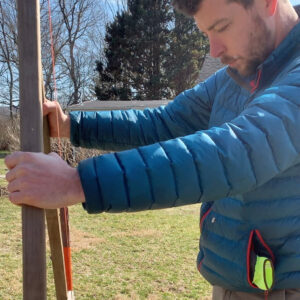
A practitioner of permaculture and owner and manager of Let it Grow Landscapes, Vic Ziminsky creates and installs edible and ecological landscape design plans for community and home gardens. He became certified to practice permaculture design through the Center of Bioregional Living, in New York City. Let it Grow Landscapes is an Organic Landcare company, certified by NOFA-CT. Vic studies at the New York Botanical Gardens School of Horticulture and Landscape Design. He taught English in Chile and studied creative writing at Binghamton University. Vic has been practicing sustainable agriculture and permaculture, professionally as Let it Grow Landscapes, since 2014. Prior to that, with his family, he employed permaculture practices at their home garden. After becoming passionate about local, sustainable food production, he left a career in the financial industry to devote himself to caring for the land.and practiced farming, particularly as a volunteer for the Food Bank of Westchester. Currently, Vic works with individuals and organizations to better take care of nature, build community, and to realize a perennial return of bountiful food and beauty in our ecosystems.
Sign up for occasional email updates about upcoming events, volunteer & job opportunities, farm happenings, and more.